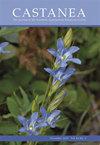Community Science Success for Herbarium Transcription in Arkansas: Building a Network of Students and Volunteers for Notes from Nature
IF 0.3
4区 生物学
Q4 PLANT SCIENCES
引用次数: 0
Abstract
ABSTRACT An estimated 390 million herbarium specimens worldwide provide data for scientific study, but specimen labels must be transcribed into standardized databases to be readily useable by the scientific community. Yet, data entry cannot be completed with current staffing and funding. Notes from Nature provides an infrastructure for community science transcription of natural history specimen labels with tutorials and a platform for communication among community scientists and researchers. The Plants of Arkansas project, now led by the Arkansas Natural Heritage Commission, built an active transcription community by coordinating local universities, recruiting service organizations, and engaging worldwide users online. Training members of service organizations creates continuing users dedicated to the project, and students learn about natural history collections and community science through real-world assignments. Our goals are to: 1) enumerate participants and transcription of the first 3.5 years of the project, 2) describe in-person events for recruitment, training, and connection with local collections, and 3) propose recommendations based on the evidence that increased engagement results in increased rates of contribution. The distribution of transcriptions per user compares to other community science projects, with a few individuals who transcribe thousands of labels. However, we have had more users that contribute >50 transcriptions in the Plants of Arkansas project. With our project's success, we offer suggestions to manage a transcription community and advance the rate of specimen digitization worldwide.阿肯色州植物标本馆转录的社区科学成功:建立一个学生和志愿者的自然笔记网络
据估计,全世界约有3.9亿份植物标本馆标本为科学研究提供了数据,但标本标签必须被转录到标准化数据库中,以便于科学界使用。然而,目前的人员配置和资金无法完成数据输入。Notes from Nature为社区科学转录自然历史标本标签提供了基础设施,并提供了教程和社区科学家和研究人员之间的交流平台。阿肯色植物项目现在由阿肯色自然遗产委员会领导,通过协调当地大学、招募服务组织和吸引全球在线用户,建立了一个活跃的转录社区。培训服务机构的成员可以创造出持续致力于该项目的用户,学生可以通过实际作业学习自然历史收藏和社区科学。我们的目标是:1)列举参与者和项目前3.5年的记录,2)描述招聘、培训和与当地收藏联系的现场活动,以及3)根据证据提出建议,这些证据表明,参与度的提高会导致贡献率的提高。每个用户的转录分布与其他社区科学项目相比,只有少数人转录了数千个标签。然而,我们有更多的用户在阿肯色州植物项目中贡献了50个转录。随着我们项目的成功,我们提出了管理转录社区和提高全球标本数字化速度的建议。
本文章由计算机程序翻译,如有差异,请以英文原文为准。
求助全文
约1分钟内获得全文
求助全文
来源期刊

Castanea
生物-植物科学
CiteScore
0.50
自引率
25.00%
发文量
28
审稿时长
>12 weeks
期刊介绍:
Castanea is named in honor of the American Chestnut tree. Castanea is thebotanical name for Chestnuts, dating back to what the ancient Greeks calledthem.
The American Chestnut is a critically endangered tree that once made up 35%of the forests of the Eastern US before being devastated by a blight thatdestroyed up to 4 billion American Chestnut trees.
Castanea serves professional and amateur botanists by reviewing andpublishing scientific papers related to botany in the Eastern United States.
We accept papers relating to plant biology, biochemistry, ecology, floristics,physiology and systematics.
 求助内容:
求助内容: 应助结果提醒方式:
应助结果提醒方式:


